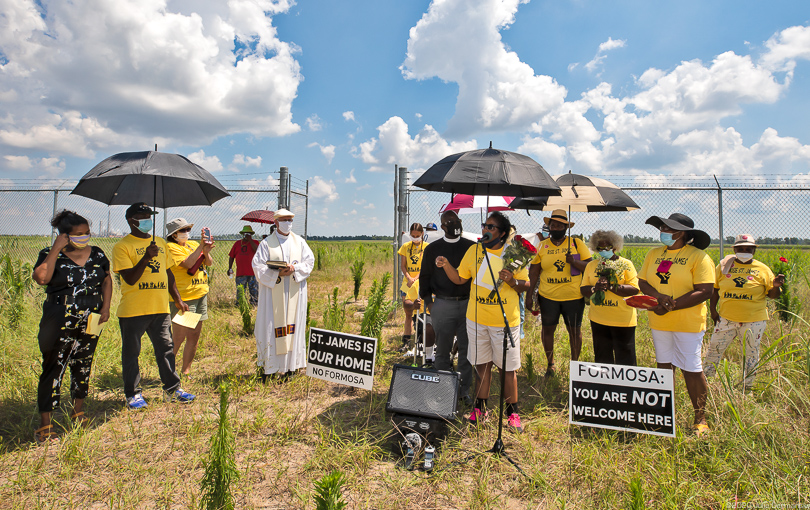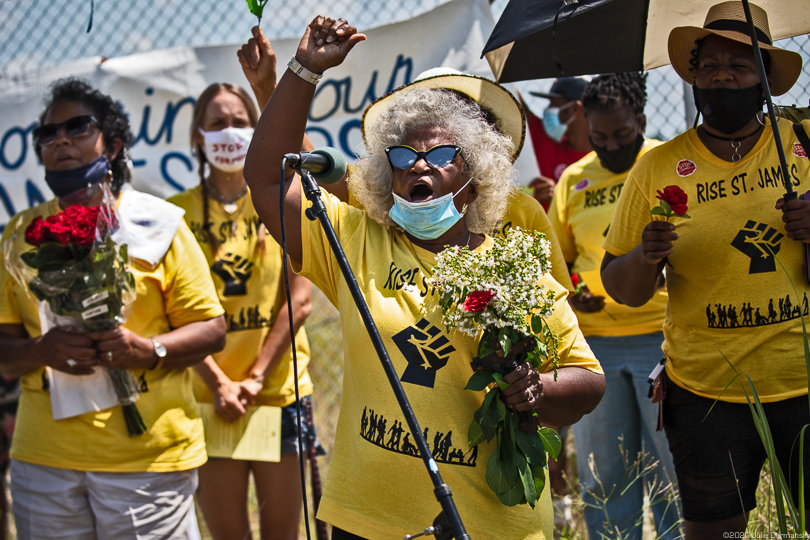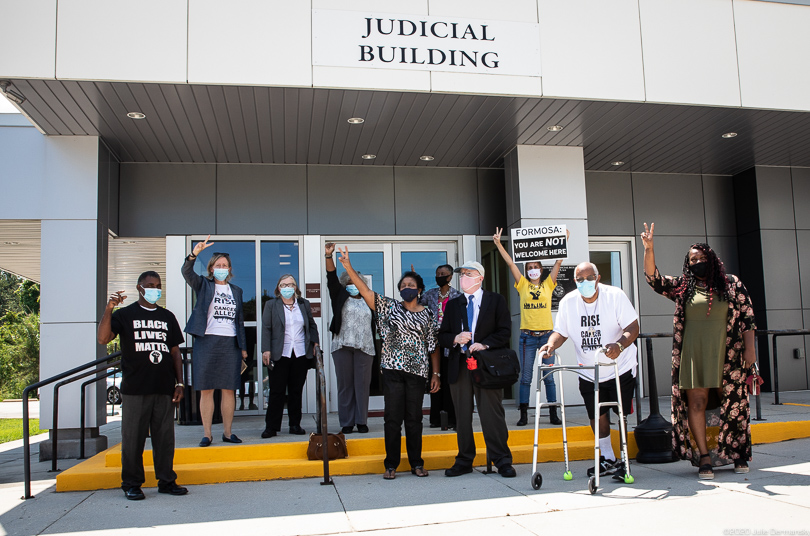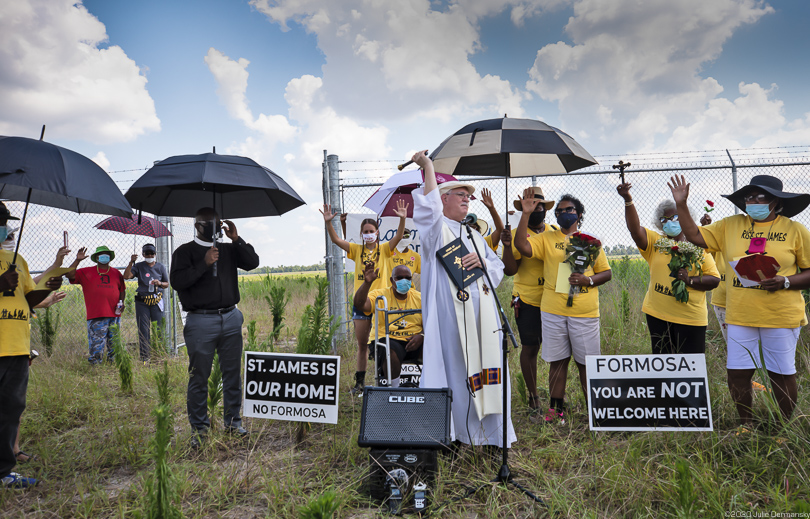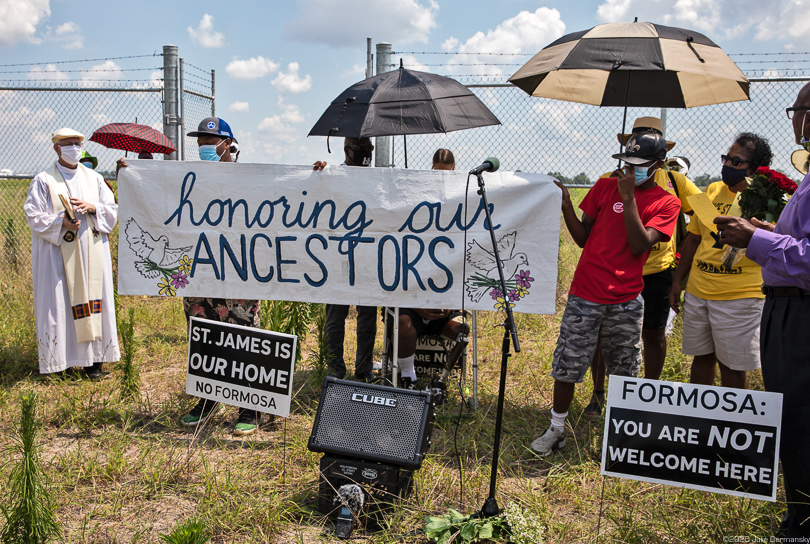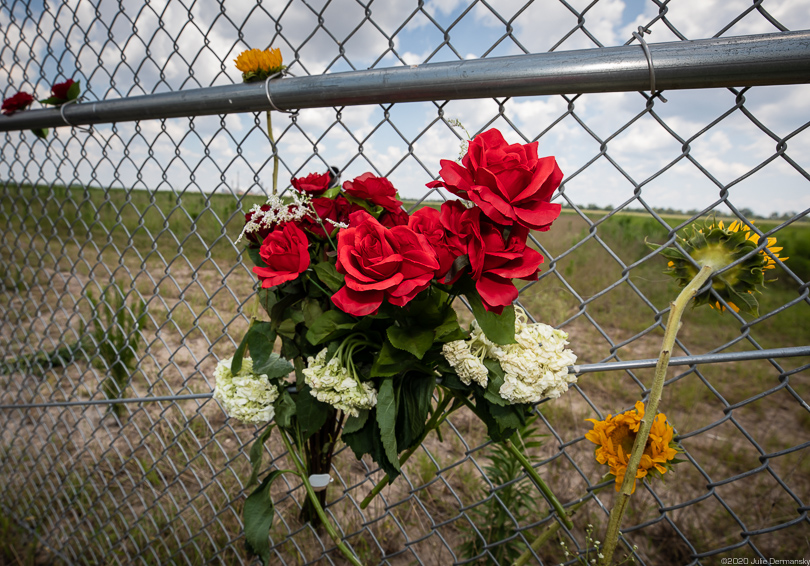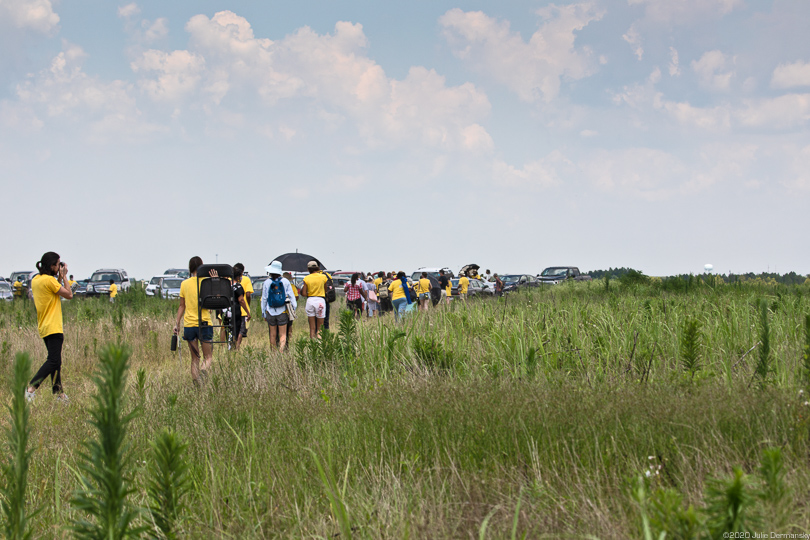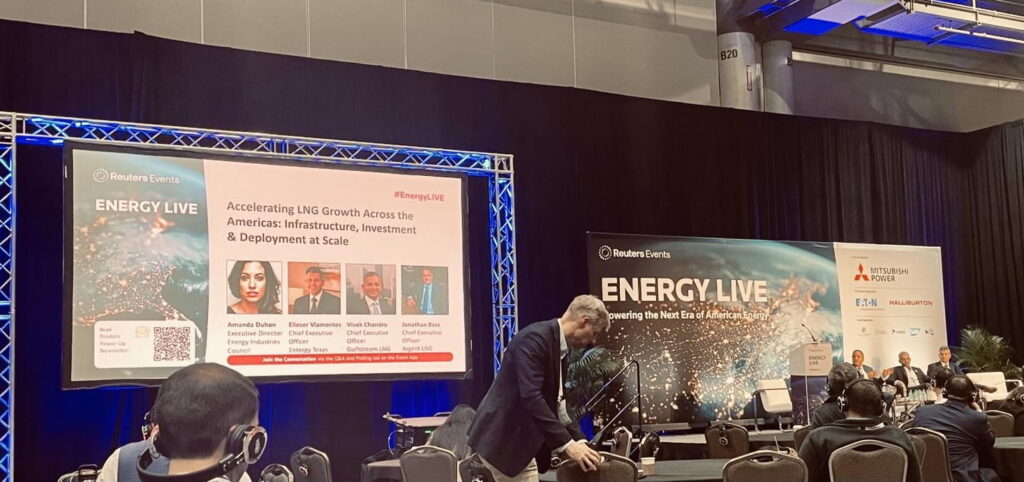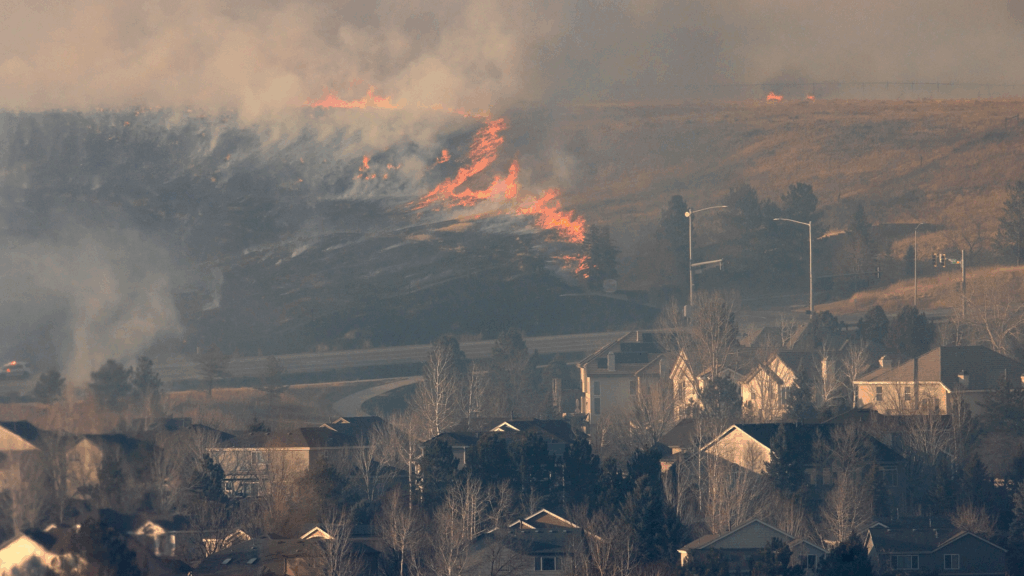“I feel like our ancestors are shouting and rejoicing in heaven about what we did for them today,” Sharon Lavigne, founder of RISE St. James, a community group fighting petrochemical plant construction in St. James Parish, Louisiana, said after a June 19 ceremony held in their honor. “We did not forget them on Juneteenth. We honored them by leaving roses at the site where their remains are buried.”
Late this morning, Lavigne and a couple dozen supporters held the memorial at what they say is a former burial ground for enslaved people that sits on the future site of a $9.4 billion plastics plant complex. But even as widespread protests against anti-Black racism have prompted a national reckoning, the ceremony at the former grave site was met with opposition. FG LA LLC, a local member of the Formosa Plastics Group, owns the property on a former sugar plantation and denied Lavigne’s request to have a Juneteenth ceremony there. It took a last-minute judge’s ruling to force the petrochemical corporation to make the ceremony legal; Lavigne had planned to hold the ceremony there, with or without permission.
Gail LeBoeuf, a member of RISE St. James, at the Juneteenth ceremony in St. James.
The site is on the banks of the Mississippi River in the middle of an 85-mile stretch between New Orleans and Baton Rouge known as Cancer Alley. The nickname comes from the dozens of petrochemical plants and refineries along the river’s banks and the poor health histories of the region’s predominantly African-American residents.
Holding the ceremony emboldened Lavigne, who has been fighting to stop the Formosa plant from being built ever since Governor John Bel Edwards announced the company’s plans in April of 2018. If built, the area’s already highly polluted air could see its toxic air pollution more than double.
The Legal Battle
On June 18, District Judge Emile St. Pierre denied FG LA LLC‘s request to overturn a judgment he made earlier this week that gave Lavigne and members of RISE St. James permission to visit the site on Juneteenth, a day that commemorates the end of slavery in America.
Sharon Lavigne, and her supporters outside of the courthouse in Convent, Louisiana, after her victory against Formosa on June 18, 2020.
During the hearing, the company’s lawyer argued that allowing the community group and its supporters onto its property would pose a great liability, a claim at which the judge scoffed. “I live here,” St. Pierre said. “I drive by the site every day.” He pointed out that he couldn’t see how any damage could come from letting the group hold its Juneteenth ceremony in an open field for an hour.
“Let’s look at where we are in America,” the judge said. “We need healing.” He encouraged the two parties to set perimeters for the visit right there in the courtroom. “It is a good time to talk. No harm could come from talking,” St. Pierre said.
But instead of discussing the prospective visit with RISE St. James, FG LA’s lawyers announced that it was moving to challenge the judge’s ruling in a final attempt to stop the Juneteenth ceremony.
The company’s lawyers continued to argue that its property is an active construction site, prompting safety and liability concerns, and that the company was not given an opportunity to be heard on the merits of the petition. However, Louisiana’s Fifth Circuit Court of Appeal denied the company’s request to overturn the ruling later that evening.
A Formosa spokesperson told the Associated Press in a statement, “It is important to note that despite assertions made about ancestral ties to the site, no archaeologist has been able to confirm the identity or ethnicity of the remains discovered on FG property.”
An archeologist hired by the Center for Constitutional Rights, which represents RISE St. James, used historic maps and aerial photographs to match up historical records of plantation cemeteries with the former gravesites on the Formosa property.
The Juneteenth Ceremony
Lavigne led a convoy of cars with RISE St. James members and supporters to the site. Security took people’s temperatures as a COVID-19 precaution, and wrote down their license plates before escorting them to the burial site.
Lavigne, who can trace her family in the area back multiple generations, opened the Juneteenth ceremony by acknowledging the evil of slavery and its aftermath and expressing her gratitude for being able to honor her ancestors. She was followed by Father Vincent Dufresne from the Catholic church in East St. James Parish, who deemed the site sacred ground by spreading holy water.
Father Vincent Dufresne deeming the burial ground for enslaved African Americans as sacred during the RISE St. James Juneteenth event.
A sign made for the ceremony to honor RISE St. James members’ ancestors.
The allotted hour was filled with song and prayer. Lavigne left red roses on the fence that the company put up around the burial site before leaving, and others added flowers as they departed too.
Roses and other flowers left behind on the fence surrounding a burial ground for enslaved people in St. James on the land Formosa where is building a petrochemical complex.
RISE St. James members and its supporters leaving a Juneteenth event honoring the group’s ancestors buried at a grave site on a former plantation in St. James where Formosa is building a petrochemical complex.
After the event, the participants held an outdoor lunch at Welcome Park nearby. Guests were encouraged to practice social distancing protocols. Louisiana, like many states, is seeing a resurgence in COVID-19 cases.
A retired special-ed teacher turned environmental justice champion, Lavigne was bubbling with joy following the ceremony. But when I asked about her ongoing fight to stop Formosa’s sprawling plastics plant in her increasingly industrialized community, her fire over the injustice of the situation came to the surface.
Despite legal challenges by RISE St. James and the Louisiana Bucket Brigade, an environmental advocacy group, challenging state air quality permits and federal wetlands permits, Formosa is starting work on the site. Trucks moving earth could be seen from the burial site.
“Formosa is starting construction even though the pandemic is still going on,” Lavigne said. It isn’t lost on her that air pollution has left many in the region with weakened health going into the pandemic. “Building the plant in a Black community shows that they just want us to die off,” she said, but she doesn’t plan to make it easy for Formosa. She plans to fight until the company is gone.
Changes that are taking place across the country following the police killing of George Floyd in Minnesota and other Black Americans have encouraged Lavigne.
“We are seeing change that should have been here a long time ago,” she said. “The world will change. The young people are coming out.”
She hopes that Governor Edwards, a southern Democrat, is taking note of the changes. “It seems like he doesn’t care if we live or die, because he is the one that approved the plant coming here,” Lavigne said, referencing the history of Cancer Alley communities pushing the Edwards administration to address the area’s pollution and health problems. “It is environmental racism. He is on the wrong side of history, but he still has time to fix it and stop Formosa.”
Main image: Sharon Lavigne speaking at the Juneteenth ceremony at the site of a former burial ground for enslaved African Americans on the site where Formosa plans to build a petrochemical complex. Credit: All photos and video by Julie Dermansky for DeSmog
Subscribe to our newsletter
Stay up to date with DeSmog news and alerts


